Belgian PM and king blast Pope Francis for church's sex abuse cover-up
legacy in blistering welcome
 Send a link to a friend
Send a link to a friend
 [September 27, 2024]
By NICOLE WINFIELD and RAF CASERT [September 27, 2024]
By NICOLE WINFIELD and RAF CASERT
BRUSSELS (AP) — Belgium’s prime minister on Friday blasted Pope Francis
for the Catholic Church’s horrific legacy of clerical sex abuse and
cover-ups in his country, demanding “concrete steps” to come clean with
the past and put victims’ interests first.
Alexander De Croo's blistering welcome speech at the start of Francis’
visit was one of the most pointed ever directed at the pope during a
foreign trip, where the genteel dictates of diplomatic protocol usually
keep outrage out of public remarks. But even King Philippe had strong
words for Francis, demanding the church work “incessantly” to atone for
the crimes and help victims heal.
Their tone underscored just how raw the abuse scandal still is in
Belgium, where two decades of revelations of abuse and systematic
cover-ups have devastated the hierarchy’s credibility and contributed to
an overall decline in Catholicism and the influence of the once-powerful
church.
Francis applauded at the end of De Croo’s speech and was expected to
meet with victims in private later Friday. "This is our shame and
humiliation,” he said in an improvised response.
“Today, words alone do not suffice. We also need concrete steps,” De
Croo told Francis and an audience of royals, church officials, diplomats
and politicians at Laeken Castle, the residence of Belgium’s royal
family.
“Victims need to be heard. They need to be at the center. They have a
right to truth. Misdeeds need to be recognized,” he said. “When
something goes wrong we cannot accept cover-ups,” he said. “To be able
to look into the future, the church needs to come clean on its past.”

Revelations of Belgium’s horrific abuse scandal have dribbled out in
bits over a quarter-century, punctuated by a bombshell in 2010 when the
country’s longest-serving bishop, Bruges Bishop Roger Vangheluwe, was
allowed to resign without punishment after admitting he had sexually
abused his nephew for 13 years.
Francis only defrocked Vangheluwe earlier this year, in a move clearly
designed to remove a lingering source of outrage among Belgians before
his visit.
Two months after Vangheluwe resigned, Belgian police staged what were
then unprecedented raids on Belgian church offices, the home of recently
retired Archbishop Godfried Danneels, and even the crypt of a prelate —
a violation the Vatican decried at the time as “deplorable.”
Danneels was then caught on tape trying to persuade Vangheluwe’s nephew
to keep quiet until the bishop retired. Finally, in September 2010, the
church released a 200-page report that said 507 people had come forward
with stories of being molested by priests, including when they were as
young as 2. It identified at least 13 suicides by victims and attempts
by six more.
Victims and advocates say those findings were just the tip of the
iceberg and that the true scope of the scandal is far greater. Police
eventually returned the documentation that was seized in the 2010 raids
to the church, scuttling hopes for criminal investigations.
Despite everything that was known and already in the public domain, the
scandal reared its head in a shocking new way last year, when a
four-episode Flemish documentary, “Godvergeten” (Godforsaken) aired on
public broadcaster VRT.
For the first time, Belgian victims told their stories on camera one
after another, showing Flemish viewers the scope of the scandal in their
community, the depravity of the crimes and their systematic cover-up by
the Catholic hierarchy.
Amid the public outrage that ensued, both a Flanders parliamentary
committee and Belgium’s federal parliament opened official inquests last
year. A follow-on investigation announced this week will look into
whether any external pressures led to the collapse of the criminal
investigation.
Significantly, both King Philippe and De Croo made their toughest
remarks about abuse in Dutch — the language spoken in the once-staunchly
Catholic Flanders where the abuse cases have gained the most notoriety —
while the more neutral parts of their speeches were delivered in French
and German.
[to top of second column]
|

Pope Francis delivers his message during a meeting with the
authorities and the civil society in the Grande Galerie of the
Castle of Laeken, Brussels, Friday, Sept. 27, 2024. (AP Photo/Andrew
Medichini)

De Croo's speech was also outside typical Vatican protocol, which
normally would have seen only the king address the pope. As occurred
in Canada, when Prime Minister Justin Trudeau addressed the pope
alongside the country's governor-general, De Croo's office requested
that he be able to speak, officials said.
The pope also referred to abuse in his remarks, insisting that the
church was “addressing firmly and decisively” the problem by
implementing prevention programs, listening to victims and
accompanying them to heal.
But after the astonishing dressing-down by the prime minister and
king, Francis went off-script to express the shame of the church for
the scandal and voice his commitment to ending it.
“The church must be ashamed and ask for forgiveness and try to
resolve this situation with Christian humility and put all the
possibilities in places so that this doesn’t happen again,” Francis
said. "But even if it were only one (victim), it is enough to be
ashamed."
Victims have demanded the church do far more, including implementing
robust reparations programs to compensate them for their trauma and
pay for the lifelong therapy many need. Some penned a letter
demanding such a reparations program, which they planned to deliver
to Francis in their private meeting.
The prime minister, king and pope also referred to a new
church-related scandal rocking Belgium, over so-called “forced
adoptions,” which echoed earlier revelations about Ireland's
so-called mother and baby homes.
After World War II and through to the 1980s, many single mothers
were forced by the Belgian church to offer their newborns up for
adoption. Often the mothers barely saw their babies before nuns took
them away, and the babies were then placed for adoption, with money
changing hands.
For those adopted, it is close to impossible now to find their birth
mothers, since the records have long ago disappeared.
Francis said he was “saddened” to learn of these practices, but said
such criminality was “mixed in with what was unfortunately the
prevailing view in all parts of society at this time.”
“Many believed in conscience that they were doing something good for
both the child and the mother,” he said, referring to the social
stigma of an unwed mother in a Catholic country. He prayed that the
church would “bring clarity” to the problem.

When Francis met with survivors of Ireland's forced adoptions in
2018, he issued a sweeping apology on behalf of the church. It's an
issue the Argentine pope understands well given Argentina’s own
history of forced adoptions of children born to purported leftists
during the 1970s military dictatorship.
Belgium's caretaker Justice Minister Paul Van Tigchelt has called
the forced adoptions ’’horror practices by the church.” No formal
figures are available, but the HLN media group that brought the
issue to the fore again last year estimated it affected up to 30,000
people.
___
Associated Press religion coverage receives support through the AP’s
collaboration with The Conversation US, with funding from Lilly
Endowment Inc. The AP is solely responsible for this content.
All contents © copyright 2024 Associated Press. All rights reserved |